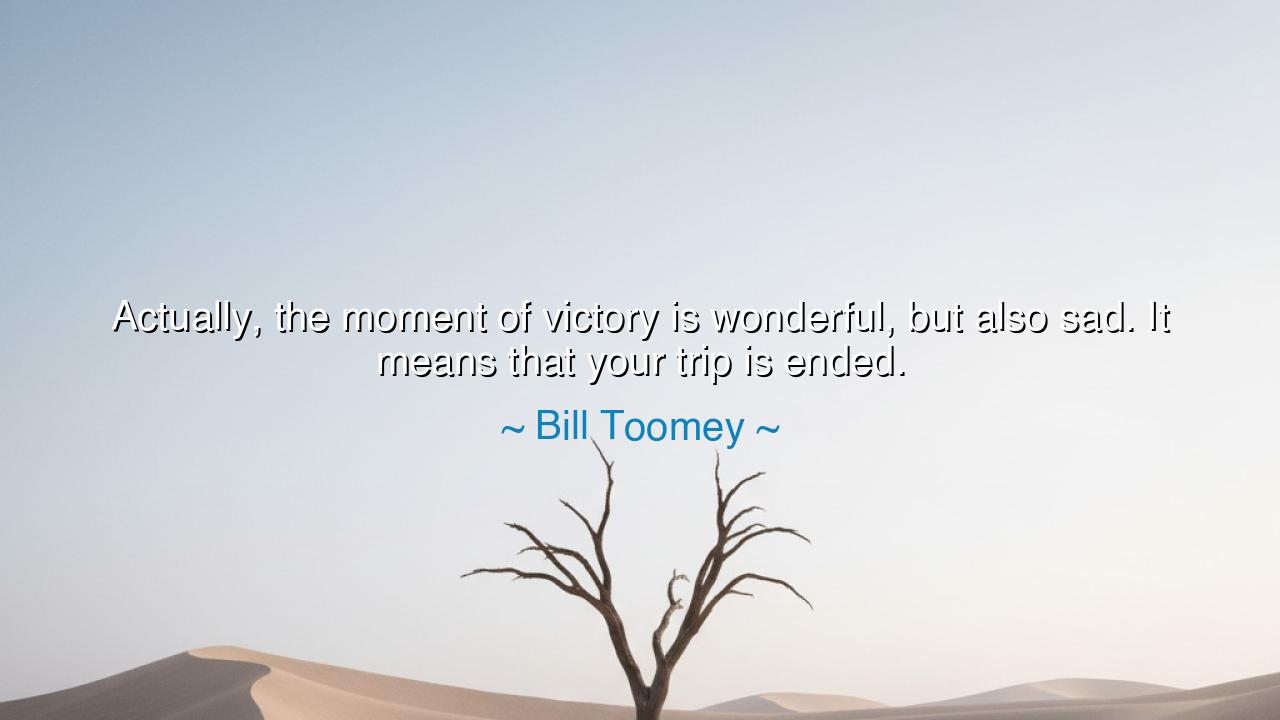
Actually, the moment of victory is wonderful, but also sad. It
Actually, the moment of victory is wonderful, but also sad. It means that your trip is ended.






“Actually, the moment of victory is wonderful, but also sad. It means that your trip is ended.” — these words, spoken by Bill Toomey, Olympic champion and decathlete, hold within them the bittersweet essence of human achievement. They remind us that victory, though radiant and exalted, carries the quiet shadow of finality. For every triumph marks not only the fulfillment of effort, but also the end of a journey — a journey that gave life its meaning, its rhythm, its purpose. To stand at the summit is glorious, yes, but it also means the climb is done, and the mountain no longer calls.
The ancients knew this paradox well. They understood that joy and sorrow are twins born of the same moment. When the warrior returns victorious from battle, the people rejoice — yet the warrior feels an emptiness, for the struggle that defined him has passed. The moment of victory is both the flowering and the fading of purpose. It is as though the gods, in their wisdom, demand that every triumph be paid for by the stillness that follows. For in the silence after applause, one begins to feel the ache of “what now?” The heart, once driven by striving, must learn again how to simply be.
Consider the story of Alexander the Great, who, after conquering the known world, wept not for joy but for sorrow — for there were no more worlds left to conquer. His victories had been his breath, his purpose, his fire. But when he reached the pinnacle, he found only stillness. The trip had ended. Like Toomey, he discovered that glory, once attained, can leave a strange emptiness behind — for the soul that has lived in pursuit suddenly finds itself without pursuit. The crown is heavy not only with pride, but with silence.
Bill Toomey’s reflection came not from philosophy alone, but from the lived experience of an athlete whose life had been measured in preparation, pain, and perseverance. To win the decathlon, the test of all human endurance and balance, is to embody perfection — and yet, when the medals are placed and the cheers fade, a certain sadness lingers. The long mornings of training, the doubt, the burning will — all are finished. The trip — the sacred struggle that gave the days meaning — has ended. Thus, victory is a paradox: it is both culmination and closure, both exaltation and farewell.
In this truth lies a deeper wisdom about life itself. Every great goal, every cherished dream, when achieved, brings both fulfillment and loss. The student who graduates feels pride, but also sorrow for the passing of youth. The parent who watches their child grow into independence rejoices, yet mourns the days of small hands and laughter. The artist who completes a masterpiece feels wonder — and a sudden emptiness, for the act of creation, that living fire, is no more. Thus, the moment of victory always bears within it a gentle grief, for to reach the end is also to let go of the journey.
Yet this sorrow is not without beauty. It teaches us that life’s worth lies not only in arriving, but in traveling — in the striving, the building, the dreaming. Toomey’s words remind us to love the path while we walk it, not merely the destination. For every journey, once completed, becomes a memory — and the joy of the memory depends on how we walked. If we hurried toward victory, we will find only emptiness at the end. But if we lived each step with passion and awareness, then even the end will glow with quiet peace.
So, my child, when your day of triumph comes — when you stand upon your mountain and the world calls your name — do not weep only for what is lost, nor cling too tightly to what is won. Smile, and bow to the journey that brought you there. Then, as the ancients did, begin anew. Seek another mountain, another song, another calling of the heart. For life, in its secret rhythm, is not a single journey, but a thousand — each ending giving birth to the next. And when you, like Bill Toomey, find yourself at the finish line, may your tears be not of sorrow alone, but of gratitude — for having lived, for having striven, and for having known the wonder of the trip itself.






AAdministratorAdministrator
Welcome, honored guests. Please leave a comment, we will respond soon